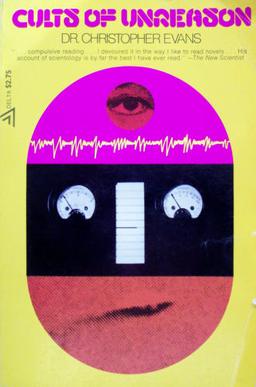Cults of Unreason
Cults of Unreason is a term used to describe various social movements and organizations that are characterized by their rejection of rationalism and scientific methods in favor of pseudoscience, mysticism, and irrational beliefs. These groups often form around charismatic leaders and can exhibit cult-like behaviors.
Characteristics[edit | edit source]
Cults of Unreason typically share several common characteristics:
- Charismatic Leadership: These groups are often led by a charismatic individual who claims to have special knowledge or abilities.
- Rejection of Rationalism: They reject established scientific principles and methods, favoring pseudoscientific or mystical explanations.
- Isolation: Members are often encouraged to isolate themselves from non-believers and mainstream society.
- Dogmatic Beliefs: They hold rigid, dogmatic beliefs that are not open to questioning or criticism.
- Exploitation: Members may be exploited financially, emotionally, or physically by the leadership.
Examples[edit | edit source]
Some well-known examples of Cults of Unreason include:
Impact on Society[edit | edit source]
Cults of Unreason can have significant negative impacts on both their members and society at large. Members may suffer from psychological harm, financial exploitation, and social isolation. Society may be affected by the spread of misinformation and the undermining of scientific literacy.
See Also[edit | edit source]
Search WikiMD
Ad.Tired of being Overweight? Try W8MD's physician weight loss program.
Semaglutide (Ozempic / Wegovy and Tirzepatide (Mounjaro / Zepbound) available.
Advertise on WikiMD
|
WikiMD's Wellness Encyclopedia |
| Let Food Be Thy Medicine Medicine Thy Food - Hippocrates |
Translate this page: - East Asian
中文,
日本,
한국어,
South Asian
हिन्दी,
தமிழ்,
తెలుగు,
Urdu,
ಕನ್ನಡ,
Southeast Asian
Indonesian,
Vietnamese,
Thai,
မြန်မာဘာသာ,
বাংলা
European
español,
Deutsch,
français,
Greek,
português do Brasil,
polski,
română,
русский,
Nederlands,
norsk,
svenska,
suomi,
Italian
Middle Eastern & African
عربى,
Turkish,
Persian,
Hebrew,
Afrikaans,
isiZulu,
Kiswahili,
Other
Bulgarian,
Hungarian,
Czech,
Swedish,
മലയാളം,
मराठी,
ਪੰਜਾਬੀ,
ગુજરાતી,
Portuguese,
Ukrainian
Medical Disclaimer: WikiMD is not a substitute for professional medical advice. The information on WikiMD is provided as an information resource only, may be incorrect, outdated or misleading, and is not to be used or relied on for any diagnostic or treatment purposes. Please consult your health care provider before making any healthcare decisions or for guidance about a specific medical condition. WikiMD expressly disclaims responsibility, and shall have no liability, for any damages, loss, injury, or liability whatsoever suffered as a result of your reliance on the information contained in this site. By visiting this site you agree to the foregoing terms and conditions, which may from time to time be changed or supplemented by WikiMD. If you do not agree to the foregoing terms and conditions, you should not enter or use this site. See full disclaimer.
Credits:Most images are courtesy of Wikimedia commons, and templates, categories Wikipedia, licensed under CC BY SA or similar.
Contributors: Prab R. Tumpati, MD


